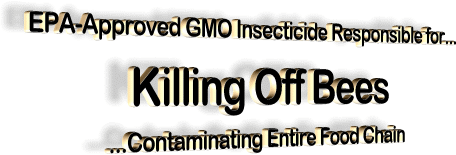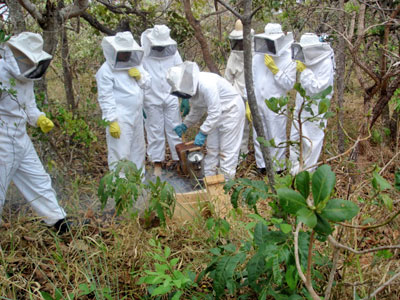|
from
NaturalNews Website
Early last year, a leaked document obtained by a Colorado beekeeper exposed the U.S. Environmental Protection Agency's (EPA) illegitimate approval of clothianidin, a highly-toxic pesticide manufactured by Bayer CropScience that the regulatory agency knew was capable of killing off bees.
Now, a new study out of Purdue
University in Indiana has not only confirmed, once again, that
clothianidin is killing off bees, but also that clothianidin's
toxicity is systemic throughout the entire food chain, which could
one day lead to the catastrophic destruction of the food supply.
They discovered that both
clothianidin and
thiamethoxam, another component of
neonicotinoid insecticides, persist in "extremely high levels" in
planter exhaust material produced during the planting of crops
treated with these insecticides, which runs contrary to industry
claims that the chemicals biodegrade and are not a threat.
The bees also transfer neonicotinoid
compounds to other plants and crops not treated with the chemicals,
which shows just how persistent these chemicals truly are in the
environment.
Without bees, which are now dying off at an alarming rate due to exposure to clothianidin and various other insecticides and fungicides, one third or more of the food supply will be destroyed, including at least 100 varieties of fruits and vegetables that rely on bees for pollination.
This is why Dr. Neil Carman,
Ph.D., scientific advisor to
Sierra Club, has put out a call for
the EPA to immediately ban the use of clothianidin and the other
neonicotinoid insecticides for the sake of protecting the food
supply from irreversible destruction.
EPA Document Shows It Knowingly... Allowed Pesticide That Kills Honey Bees
-
Wik-Bee Leaks - December 10, 2010
from
FastCompany Website
The world honey bee population has plunged in recent years, worrying beekeepers and farmers who know how critical bee pollination is for many crops.
A number of theories have popped up as to why the North American honey bee population has declined - electromagnetic radiation, malnutrition, and climate change have all been pinpointed.
Now
a leaked EPA document reveals that
the agency allowed the widespread use of a bee-toxic pesticide,
despite warnings from EPA scientists.
The document invalidates a prior Bayer study that justified the registration of clothianidin on the basis of its safety to honeybees:
The entire 101-page memo is damning (and
worth a read). But the opinion of EPA scientists apparently isn't
enough for the agency, which is allowing clothianidin to keep its
registration.
Clothianidin was still allowed on the
market while
Bayer worked on a botched toxicity study,
in which test and control fields were planted as close as 968 feet
apart.
But without honey bees, our entire food supply is in trouble.
|

